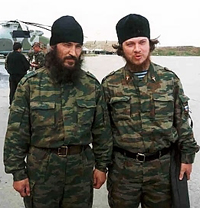Canissia Passes the "Consenting Adults" Rule

Mr. B. Stanler and his two lovely brides, Talia and Rina.
"Basically, what happens between legally consenting adults is not the business of the state," said Justice & Legal Affairs Minister Kal Vyron.
Canissian law has been vague about what constitutes marriage, with "traditional" interpretations being widely accepted but, upon inspection, not specifically codified.
"Marriage, by itself, is mentioned in civil law," said Minister Vyron, "But by and large the interpretation of what that means was left to whatever churches or temples or civil interests performed the ceremony, and what the people themselves practiced. All we really looked out for was illegal practices, such as child marriages or pedophilia, which are prosecuted."
But the lack of legal definition has allowed marriage law to vary by province and sometimes even by city. Some provinces did not recognise marriages performed in other provinces.
"To be honest, this was not a problem among adherents to traditional marriages-- one man, one woman. And for the most part, non-traditional marriages were largely overlooked, but from time to time we had to deal with cases of discrimination, withheld benefits, and so on."
With today's ruling in the Canissian Parliament, the civil definition is clarified by the "Legally Consenting Adults" ruling-- basically, a relationship and/or living arrangement made between legally consenting adults is recognised by law.
"By 'legally consenting adults', we mean, obviously, that mere physical age is not the sole defining factor," says Minister Vyron, "Consent must fit the legal definition, so age is a factor, but also mental capacity and the lack of any coercion, direct or implied."
While the usual image of marriage-rights advocacy has been the movement to recognise gay marriage specifically, the movement for legal clarification of marriage has been made up of many groups, such as advocates for multiple marriages, both polygamist and polyandrist, and communal or 'group' marriages, typical on counter-culture communes.
"Now, these people have legal protection," Minister Vyron said, "No one can discriminate based on lifestyle choices."
While reaction on the street has, for the most part, been subdued, there are some who feel that clearly legalizing non-traditional marriages is essentially encouraging behavior that is considered "disgusting" or "immoral". Demonstrations by more activist religious groups have been held, but they have been peaceful.
Others take a political view of the ruling, and say that it has nothing to do with love or marriage, but is merely a reaction to the Orthodox Church of the Red Technocracy --an attempt to embarrass the Patriarch of the OMSK nation.
"That is just plain silly," said Minister Vyron, "The status of marriage in the Orthodox Church did point out that we should address this issue, but our chosen stance on this is not a juxtaposition of their stance. It is recognition of the fact that the state has no business interfering in people's private lives, and that is all."
Other critics point to the King's lifestyle, and say that the ruling is simply a fig leaf to cover for his excesses. But again, the only negative reactions to the King's lifestyle have come from the small band of hard-core religious adherents, largely marginalized by mainstream society.
"Those religious types, they are dangerous," said Marty Kepechneker, of the Gay And Lesbian Alliance, or GALA. "They are militant and closed off, and they have an agenda to take people's children and turn them into people just like them. Be wary of the religious agenda."
King Arik Coyotus-I was not available for comment, being busy with state business on the Libertopia issue.








 "
"











